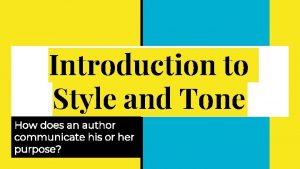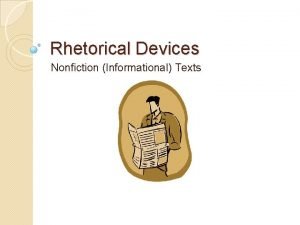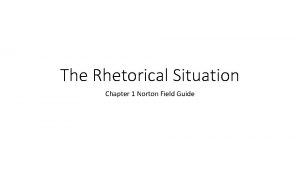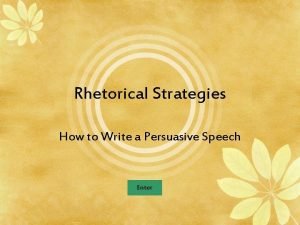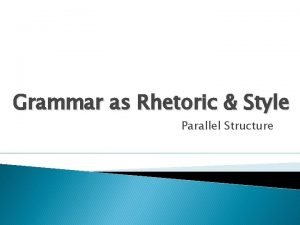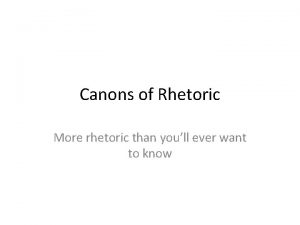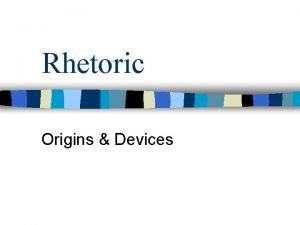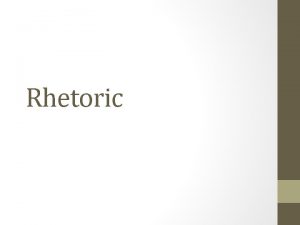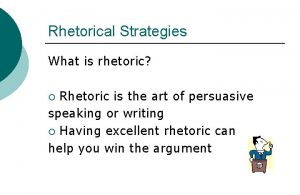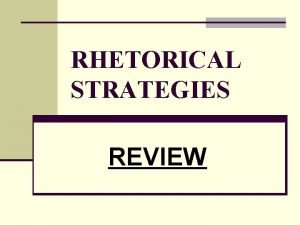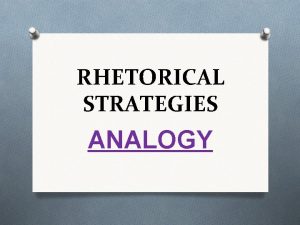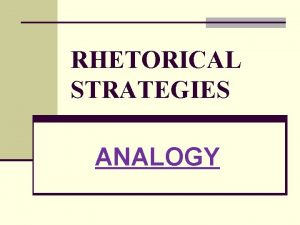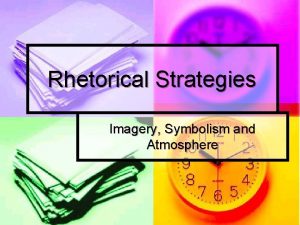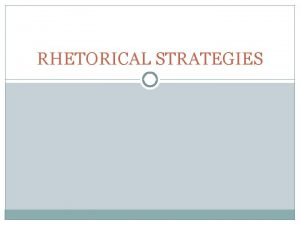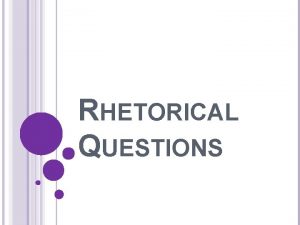What are Rhetorical Strategies What is rhetoric Rhetoric













- Slides: 13

What are Rhetorical Strategies?

What is “rhetoric”? • Rhetoric is the “art or study of effective language. ” • Effective language is language used to an effect – this includes writing that accomplished the writer’s goal. The writer’s goal was to communicate a specific idea.

• Therefore, rhetoric may be described as “persuasive use of language” and “rhetorical strategies” are techniques by which writers persuade readers. Rhetorical Strategies

• Allusion or direct reference to a note-worthy source can associate a new idea to a traditionally respected source. • Adoption of another person’s language or style can either demonstrate a respect for or a disrespect for another writer. Allusions

• For example, if you were trying to persuade a restaurant worker to wear gloves, you might say to him or her : “It is the policy of the Georgia Restaurant Association for all employees to wear gloves. ” Those words are persuasive because they sound formal and authoritative. Let’s make those examples more clear!

• Emotionally “loaded words” can demonstrate a writer’s intense feeling. For example, if you wished to demonstrate how much you liked a movie you could say it was : “The most awe-inspiring display of artistry ever presented on the big screen. ” Emotional Appeal

Allusion/Reference • This is a strong principle of advertising. People connect people and ideas through juxtaposition. If I want to convince you to wash your hands, I may say, “thou shalt wash thy hands. ” This connects the idea of washing one’s hands to the commandments.

• Humor can be used in very persuasive ways. It can be • • used to “win you over, ” to make you like the writer and, therefore, like his or her ideas. Humor comes in many forms. hyperbole (exaggeration) understatement irony (verbal, situational, dramatic) sarcasm Humor

• These three literary terms are essentially the same. You can think of an ATM machine to help you remember them. They are by definition the emotional feelings aroused by the chosen diction. Sometimes you can tell the emotional state of the writer (or the writing) by examining individual words. Writers who choose diction as a means to contribute to tone are using tone as a rhetorical technique. Attitude, Tone, or Mood

• Logos is the “logic” an author uses. Look at her arguments. Are they sound? Do they contain fallacies? Does Point B logically follow Point A? Logos

• Ethos is the “ethics” or credibility of an author. How qualified is this writer/speaker to present her information to you? Are they an expert in this subject? Ethos

• Pathos is the “empathy” or emotional appeal the author uses. How does the writer/speaker tug on your emotions? Does the writing make you angry? Sad? Intrigued? Pathos

Which strategies are most effective? Some rhetorical strategies are generally more persuasive than others, but often the audience and circumstances may affect a rhetorical strategy’s persuasiveness.
 Antigentest åre
Antigentest åre A modest proposal rhetorical appeals
A modest proposal rhetorical appeals Rhetorical strategies in john smith's letter to queen anne
Rhetorical strategies in john smith's letter to queen anne Rhetorical devices nonfiction text
Rhetorical devices nonfiction text Rhetorical strategies
Rhetorical strategies Rhetorical devices
Rhetorical devices Norton rhetorical strategies
Norton rhetorical strategies Rhetorical question examples
Rhetorical question examples Rhetorical strategies
Rhetorical strategies Soaps letter from birmingham jail
Soaps letter from birmingham jail Rhtorical devices
Rhtorical devices Parallelism in a speech
Parallelism in a speech Canon of rhetoric
Canon of rhetoric Aristotle rhetoric
Aristotle rhetoric


